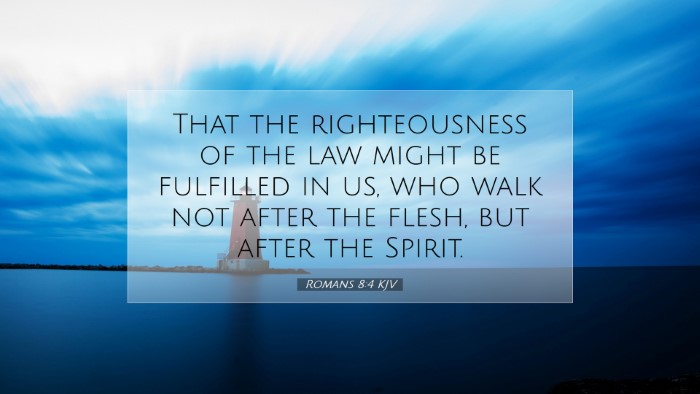Commentary on Romans 8:4
Romans 8:4 states: "That the righteousness of the law might be fulfilled in us, who walk not after the flesh, but after the Spirit." This verse is pivotal in understanding the relationship between law, righteousness, and the Christian life. In this commentary, we draw insights from renowned public domain commentaries to elucidate its profound implications for believers.
Context and Significance
To appreciate the depth of Romans 8:4, it is essential to consider its context within the broader framework of Paul's epistle to the Romans. The Apostle Paul presents a dichotomy between living according to the flesh versus living according to the Spirit. The preceding verses set the stage for the transformative power of the Spirit, enabling believers to fulfill the law's requirements.
-
Matthew Henry's Commentary:
Henry emphasizes that Christ came not to abolish the law but to fulfill it. The term “righteousness of the law” suggests that the moral excellence required by the law is not only necessary but also attainable through the Spirit. Henry notes that Christians are called to exhibit a new kind of living that reflects this righteousness.
-
Albert Barnes' Notes:
Barnes elaborates on the dual nature of the Christian experience, accentuating the importance of walking "not after the flesh." He posits that this walking denotes a lifestyle characterized by the guidance and influence of the Holy Spirit. The practical outworking of faith manifests in a lifestyle that aligns with God's will manifest in the law, showing how genuine faith results in a transformed life.
-
Adam Clarke's Commentary:
Clarke points out that the phrase “who walk not after the flesh” represents the believer's conscious decision to eschew worldly desires. He underscores the crucial role of the Holy Spirit in empowering believers to rise above their sinful inclinations. Clarke also emphasizes that this walking is a process that requires continual dependence on the Spirit for strength and guidance.
Fulfilling the Righteousness of the Law
The phrase "that the righteousness of the law might be fulfilled in us" poses a theological depth that warrants examination. It points to the reality that through Christ, and in the power of the Holy Spirit, believers can live righteous lives. This righteousness is not self-generated but is a direct result of the indwelling Spirit.
-
Theological Implications:
The fulfillment of the law in the believer underlines the transformative aspect of salvation. It signifies that while the law exposes sin, it is through the Spirit that believers can achieve what the law demands. The earlier chapters of Romans highlight the insufficiency of human efforts to attain righteousness (Romans 3:20), yet this verse reassures that through Christ, believers are enabled to reflect God's righteousness.
-
Practical Applications:
This verse brings forth practical implications for the Christian life. Believers are called to a life led by the Spirit, which requires intentionality in their spiritual journey. The growing in grace and knowledge of Christ becomes a reality when one submits to the Spirit's guidance, aligning thoughts, actions, and motivations with God's will.
The Role of the Holy Spirit
Understanding the role of the Holy Spirit is paramount in interpreting Romans 8:4. The verse speaks to the transformative power of the Spirit in enabling believers to live righteously. The emphasis on walking "after the Spirit" suggests an active and continuous process of sanctification.
-
Spiritual Warfare:
Both Henry and Barnes reflect on the concept of spiritual warfare implicit in this verse. They assert that the journey of a Christian is replete with struggles against the flesh. The daily decision to walk in the Spirit is an ongoing battle, illustrating the need for vigilance and reliance upon God’s strength.
-
Living in the Spirit:
Clarke remarks that to walk in the Spirit, one must be cognizant of the Spirit’s prompts and guidance. This means developing an intimate and personal relationship with the Holy Spirit, fostering a sensitivity to the Spirit's leading in every aspect of life.
Conclusion
In conclusion, Romans 8:4 encapsulates the essence of the Christian life, underscoring the profound implications of living by the Spirit. The insights from public domain commentaries by Matthew Henry, Albert Barnes, and Adam Clarke illuminate the rich theological truths and practical applications found within this verse. For pastors and theologians, this passage serves as a reminder of the transformative power of the gospel, encouraging believers to walk in the Spirit and fulfill the righteousness God desires.
As the church today seeks to navigate the complexities of modern life, Romans 8:4 provides a powerful exhortation to pursue a Spirit-led life that reflects God’s righteousness in a world in need of hope and redemption.


